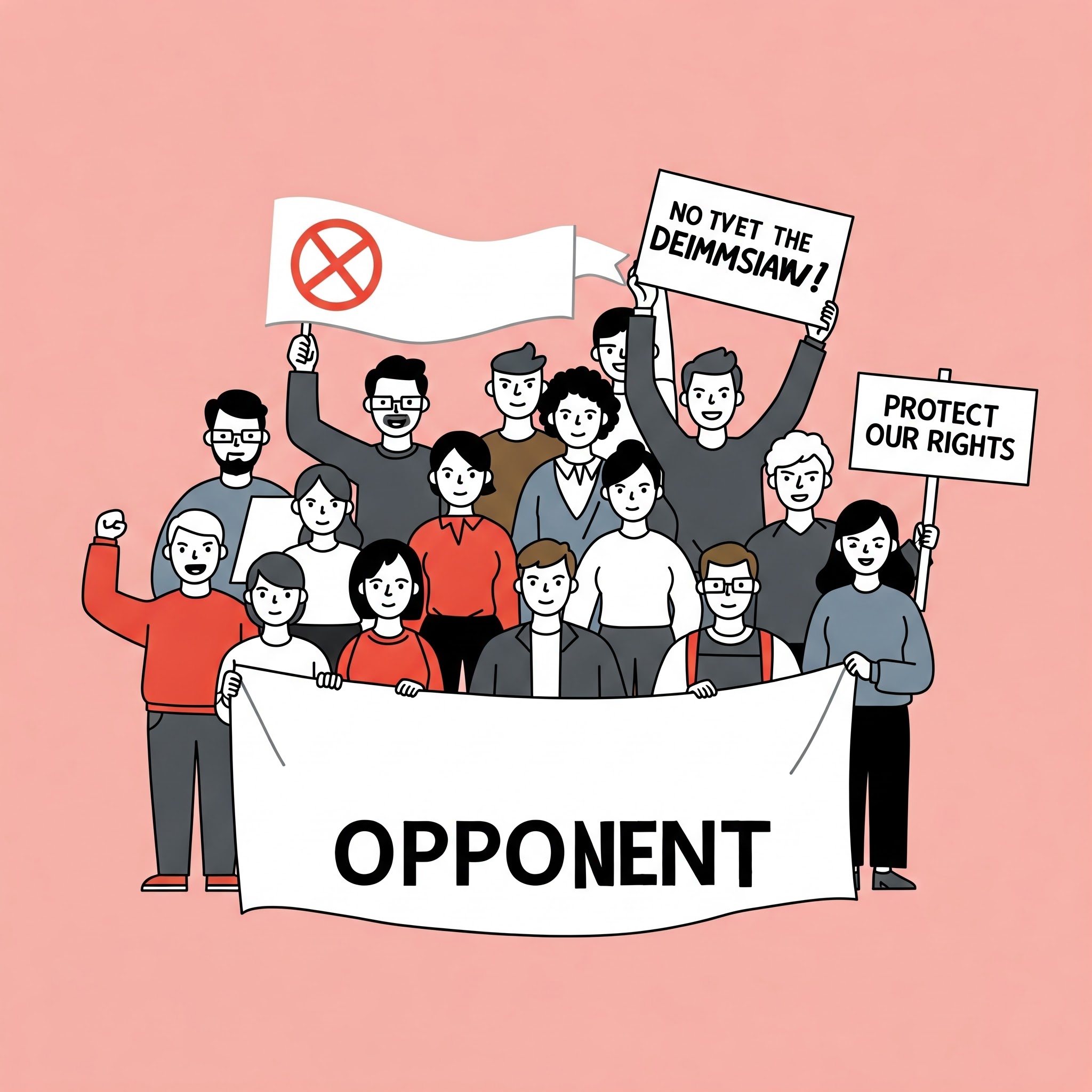Opponent
Definition
An "opponent" is a person or group that competes against another in a contest, game, or conflict. The term can also describe someone who disagrees with or resists an idea, policy, or action.
Parts of Speech
- Noun
- Adjective
Pronunciation
American English
- IPA Pronunciation: /əˈpoʊ.nənt/
- Respelling: uh-POH-nuhnt
British English
- IPA Pronunciation: /əˈpəʊ.nənt/
- Respelling: uh-POH-nuhnt
Etymology
The word "opponent" comes from the Latin "opponens," the present participle of "opponere," meaning "to set against" or "oppose." It is a combination of "ob-" (against) and "ponere" (to place). The term entered English in the late 16th century.
Derivatives
- Opposition (noun)
- Oppose (verb)
- Oppositional (adjective)
- Opponentship (noun)
- Opponency (noun, rare)
Synonyms
- Adversary
- Rival
- Competitor
Antonyms
- Ally
- Supporter
- Friend
Usage
The term "opponent" is widely used in competitive, political, and general contexts. For example: "She defeated her opponent in the final match," or "The senator faced strong opposition from political opponents."
Related Terms
- Opponent: A rival in sports or arguments.
- Competitor: A person or entity vying for the same goal.
- Antagonist: Someone who actively opposes or is hostile to another.
Detailed Definitions
Noun
- A person or group competing against another: Refers to an individual or entity in a competitive setting.
- Example: "The team faced a formidable opponent in the championship."
- Someone who disagrees with or resists an idea or policy: Indicates opposition in ideological or political contexts.
- Example: "Opponents of the new law have voiced their concerns."
Adjective
- Set against or opposing: Describes a position or attitude that is contrary to another.
- Example: "They held opponent views on the matter."
opponent



🇨🇳 Mandarin Chinese
- "对手" (opponent)
- IPA Pronunciation: /twei˥˩ ʂu˨˩˦/
- Respelling in English: duìshǒu
- "反对者" (objector)
- IPA Pronunciation: /fan˥˩ twei˥˩ t͡ʂɚ˧˥/
- Respelling in English: fǎnduìzhě
🇮🇳 Hindi
- "प्रतिद्वंद्वी" (opponent)
- IPA Pronunciation: /pɾətɪd̪ʋənd̪ʋi/
- Respelling in English: pratidvandvi
- "विरोधी" (adversary)
- IPA Pronunciation: /vɪroːd̪ɦiː/
- Respelling in English: virodhi
🇪🇸 Spanish
- "Oponente" (opponent)
- IPA Pronunciation: /oponente/
- Respelling in English: oponente
- "Adversario" (adversary)
- IPA Pronunciation: /aðβeɾˈsaɾjo/
- Respelling in English: adversario
🇫🇷 French
- "Opposant" (opponent)
- IPA Pronunciation: /ɔpɔzɑ̃/
- Respelling in English: opposant
- "Adversaire" (adversary)
- IPA Pronunciation: /adveʁsɛʁ/
- Respelling in English: adversaire
🇸🇦 Modern Standard Arabic
- "خصم" (opponent)
- IPA Pronunciation: /χaʂm/
- Respelling in English: khasm
- "معارض" (adversary)
- IPA Pronunciation: /muʕaːrid/
- Respelling in English: mu'arid
🇧🇩 Bengali
- "প্রতিপক্ষ" (opponent)
- IPA Pronunciation: /protipokʃo/
- Respelling in English: protipokkho
- "বিরোধী" (adversary)
- IPA Pronunciation: /birodhi/
- Respelling in English: birodhi
🇷🇺 Russian
- "Оппонент" (opponent)
- IPA Pronunciation: /ɐpɐˈnʲent/
- Respelling in English: opponient
- "Противник" (adversary)
- IPA Pronunciation: /prətʲɪvnʲɪk/
- Respelling in English: protivnik
🇵🇹 Portuguese
- "Oponente" (opponent)
- IPA Pronunciation: /oponẽtʃi/
- Respelling in English: oponente
- "Adversário" (adversary)
- IPA Pronunciation: /ɐdvɛɾˈsaɾiu/
- Respelling in English: adversario
🇮🇩 Indonesian
- "Lawan" (opponent)
- IPA Pronunciation: /lawaŋ/
- Respelling in English: lawan
- "Penentang" (objector)
- IPA Pronunciation: /pənəntaŋ/
- Respelling in English: penentang
🇩🇪 German
- "Gegner" (opponent)
- IPA Pronunciation: /ˈɡeːɡnɐ/
- Respelling in English: gegner
- "Widersacher" (adversary)
- IPA Pronunciation: /viːdɐˈzaːχɐ/
- Respelling in English: widersacher
🇯🇵 Japanese
- "対手" (opponent)
- IPA Pronunciation: /taite/
- Respelling in English: taite
- "反対者" (objector)
- IPA Pronunciation: /hantaɪʃa/
- Respelling in English: hantaisha
🇻🇳 Vietnamese
- "Đối thủ" (opponent)
- IPA Pronunciation: /ɗoəi˧ˀ˨ʔ thu˧ˀ˨ʔ/
- Respelling in English: doi thu
- "Kẻ đối đầu" (adversary)
- IPA Pronunciation: /ke˧ˀ˨ʔ ɗoəi˧ˀ˨ʔ dau˧ˀ˨ʔ/
- Respelling in English: ke doi dau
🇰🇷 Korean
- "상대" (opponent)
- IPA Pronunciation: /sʰaŋdɛ/
- Respelling in English: sangdae
- "반대자" (objector)
- IPA Pronunciation: /pandɛd͡ʑa/
- Respelling in English: bandaeja
🇹🇷 Turkish
- "Rakip" (opponent)
- IPA Pronunciation: /ɾaːˈcip/
- Respelling in English: rakip
- "Muhalif" (objector)
- IPA Pronunciation: /muhaːlif/
- Respelling in English: muhalif
🇵🇰 Urdu
- "حریف" (opponent)
- IPA Pronunciation: /həriːf/
- Respelling in English: hareef
- "مخالف" (adversary)
- IPA Pronunciation: /muxɑːlif/
- Respelling in English: mukhalif





